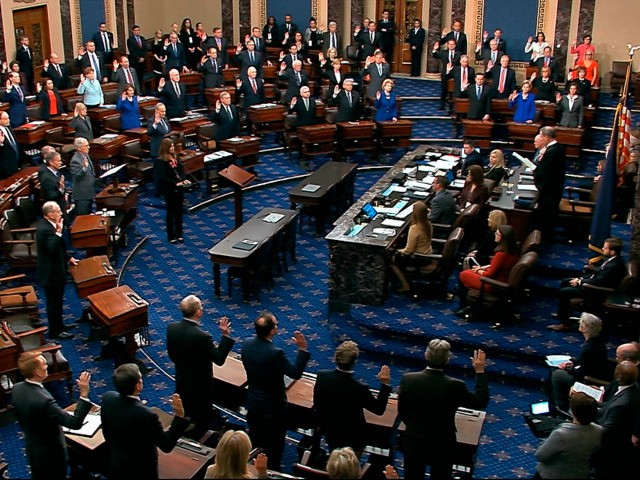The impeachment trial at the Republican-controlled Senate will likely carry on past the State of the Union, the Iowa caucuses, and maybe even the New Hampshire primaries, several news outlets recently projected, contradicting White House predictions of a quick process.
February is when the Iowa caucuses (3rd), the State of the Union (4th), and the New Hampshire primaries (11th) will occur.
News reports that the Senate trial will last longer than two weeks contradicts White House predictions.
“I think it’s extraordinarily unlikely that we’d be going beyond two weeks,” an unnamed senior White House official told reporters in a phone briefing on Wednesday. “We think that this case is overwhelming for the president, and the Senate is not going to have any need to be taking that amount of time on this.”
It appears a November 2019 forecast by Senate Intelligence Committee chairman Richard Burr (R-NC) may come to pass. He reportedly projected it would last “six to eight weeks”:
On Thursday, the Hill noted:
Sen. Roy Blunt (R-Mo.), who initially predicted the trial would be over by the State of the Union, told reporters that he now expects the proceeding will stretch beyond the scheduled Feb. 4 address.
The first phase of the trial – initial arguments and questions from senators – is expected to last roughly two weeks. After that, senators will still need to make a decision on hearing from witnesses and, eventually, vote on convicting or acquitting Trump.
“Clinton’s trial came to a close on Feb. 12, 1999, more than a month after it began,” Politico added on Tuesday. “A similar trial for Trump, if it begins this week, would end on Feb. 21 — but could end much sooner if Senate Republicans take a different path.”
According to the Hill, the time frame of the Senate trial presents hurdles for the White House hopefuls who serve in the Senate by forcing them to remain in the nation’s capital through the Iowa caucuses in early February.
Some Democrat senators who are running in the looming presidential elections late this year have already conceded that the trial will likely hurt their chances to end up in the White House.
All senators are required to attend the Senate trial proceedings.
House Speaker Nancy Pelosi (D-CA) held the articles of impeachment hostage for weeks after they were approved nearly exclusively along party lines with no Republicans voting in favor on December 18.
Her move delayed the trial in the Senate, putting some of her fellow Democrats in the position of missing campaigning in early voting states.
On Wednesday, the speaker finally relented and signed the two articles — accusing President Trump of abuse of power and obstruction of Congress.
During a historic ceremony on Wednesday evening, Democrat lawmakers hand-delivered the long-awaited articles “in a procession through the Capitol that was led by the House clerk and sergeant-at-arms and included the House managers,” NBC News noted.
Trump is only the third president in U.S. history to be impeached. He is expected to be acquitted by the GOP-led Senate. No president has ever been removed from office through the impeachment process.
Allowing the testimony of additional witnesses could further delay the end of the Senate trial.
The Hill pointed out on Wednesday:
Some senators initially expressed hope that the trial could be finished by Feb. 4, when Trump is scheduled to deliver his State of the Union address, but now that timeline looks unlikely. How long the process lasts depends on whether senators vote after opening arguments to subpoena key witnesses.
“If people decide they want to call witnesses, it could probably go on for a while,” Senate Majority Whip John Thune (R-SD) reportedly declared.
He had indicated that ending the Senate trial by early February is a “fairly tight deadline” that is unlikely to be met, the Hill reported.

COMMENTS
Please let us know if you're having issues with commenting.